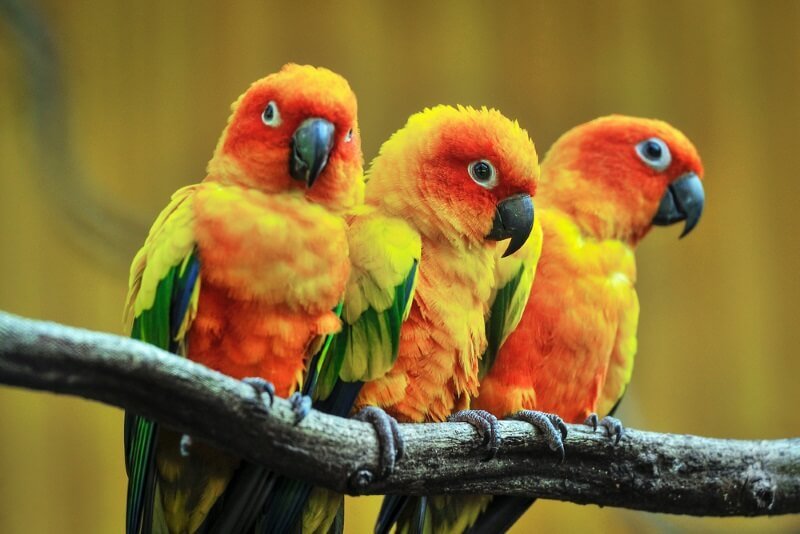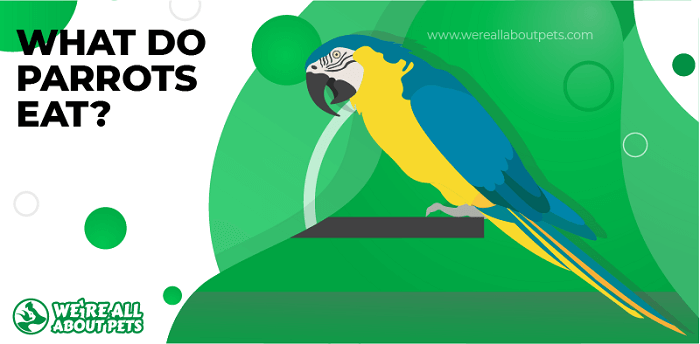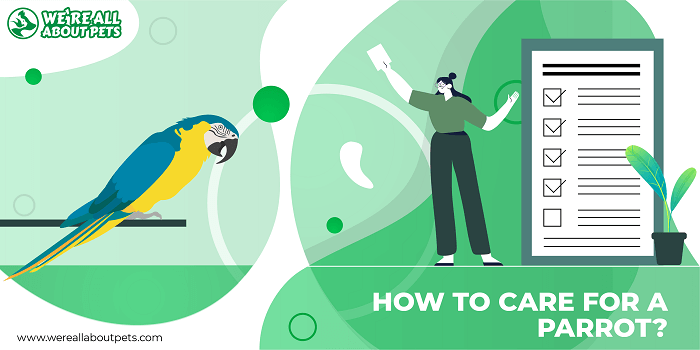Quaker Parrot: lifespan, Price & Care (All You Need To Know)
This page contains affiliate links. We may earn money or products from the companies mentioned in this post through our independently chosen links, which earn us a commission. Learn More
Quaker parrots, also known as Monk parakeets, are fairly small for a parrot species at only around 12 inches long. They are well-known for their comedic personalities and their speech abilities, and can make fun and interactive pets.
They usually live between 20 to 30 years in captivity, perhaps longer, and are the only parrot species known to build nests.
They are monomorphic (males and females look exactly alike) and are known for their bright green colour with a grey breast, throat and cheeks and blue flight feathers. There are now a variety of colour mutations seen in the species due to captive breeding programs.
Personality
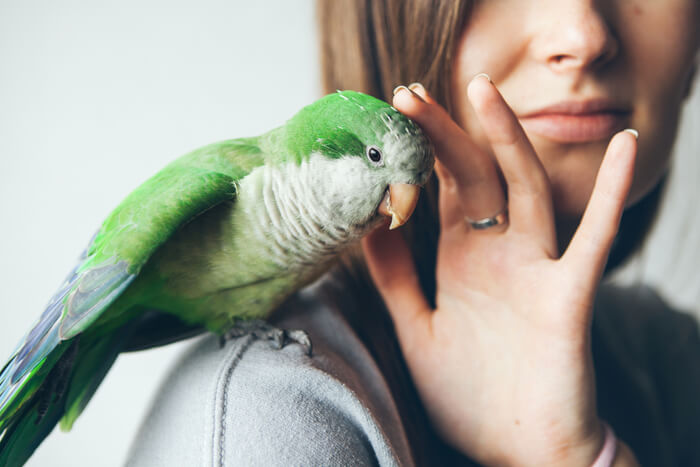
Quaker parrots tend to be bold and confident, very happy to be social and entertaining.
They love an audience and are talented at learning tricks to amuse the crowd!
They are also well known to be excellent talkers and can be swiftly taught a range of words and sounds. Quakers are excellent mimics and can even learn to sing.
They can be very chatty, but do not tend to be excessively loud, although like all parrots they can screech when they want to.
This parrot species can make excellent pets as they tend to form a strong bond with their owner when kept in captivity. Affectionate and loving, they are amongst the gentler of the parrot species and so can be suitable with children in the household.
They do not cope well with being alone or without human company, they are very social and form strong bonds with other quaker and their human owners.
An intriguing feature of this species is the ‘quaking’ from which they get their name. They are well-known for bobbing around and shaking in a way that can look strange, but is actually perfectly normal behaviour for this species.
Care
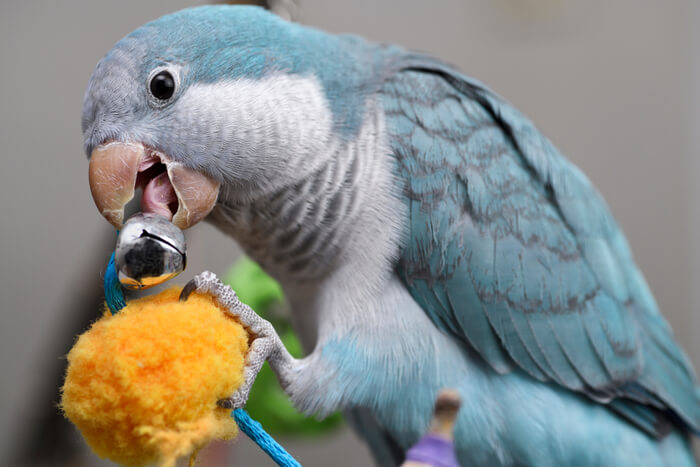
Quaker parrots are excellent chewers, and have also been known to escape from cages, so their enclosure needs to be suitably tough. They are active for their size, and care must be taken not to provide too small a cage. 18 inches square is the very minimum required, although ideally bigger. There are some cages suitable parrots here. Quakers are territorial and can become aggressive if they are defending their home.
Introducing a new bird to a resident quaker must therefore be done with great care. Usually the introduction is recommended to take place somewhere neutral, as introducing a new quaker into an existing quaker territory will result in aggressive fighting rather than bonding. If introduced carefully, quakers do form strong pair bonds.
These parrots are small but very active and require at least 2-3 hours of exercise time outside their cage every day. This should be in a room that has been made safe – doors and windows should be closed, with no fans, pets or any plants that may be toxic.
Quakers are the only species of parrot to nest build and will need this innate desire to be fulfilled, but this does mean they need to be closely supervised as they will try and take all kinds of materials into their cage to nest with. Providing suitable substrates to allow them to weave and build a nest is a good idea. The nests they build are own-shaped and can be very large.
Chew toys, bells and balls will provide excellent stimulation and fun for these birds, who also love to splash around in a water bath. These intelligent birds also gain great satisfaction from puzzle toys. Toys can be very important for pet birds to provide stimulation and reduce frustration.
Quaker parrots can be very destructive though, so may get through chew toys very quickly – choose suitably hard-wearing ones so that they don’t need to be replaced quite so often!
What Do Quaker Parrots Eat
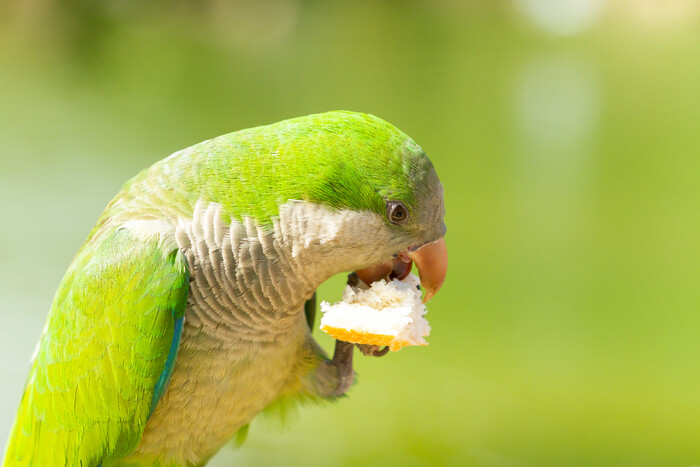
In the wild, these parrots would eat fruits, vegetables and nuts. In captivity, it is recommended they eat a high-quality complete pellet mix, such as one of these examples. In addition, they should be offered a selection of fresh fruit and vegetables, leafy greens and nuts. Beware that some nuts and seeds such as sunflower seeds and peanuts are high in fat and should be fed sparingly.
As they are fairly small, they should only need around 3 tablespoons worth of pellets daily, alongside around a quarter of a cup of fruit and vegetables. Make sure any food that is not eaten is discarded so that food isn’t present in the cage when past its best. There is some good information on how to best feed your bird here.
How Much Are Quaker Parrots?
On avg. Quaker Parrots may cost anywhere from $200 to $600, there are various factors in play such as how the bird was raised and the overall reputation of the breeder.
Why Are Quaker Parrots Illegal in Some Places?
They can be destructive in the wild, which has led to them being classified as illegal in some states.
Frequently Asked Questions
Is a quaker parrot a good pet?
These birds can make excellent pets, as they are not too large in size but are certainly big in character! Fun and friendly, they make entertaining companions. However, as with all birds, they need a high level of care, and for their size need a large enclosure as they are so active.
Why are quaker parrots illegal?
Quaker parakeets can form large colonies in the wild, and their chewing habit leads these groups to be highly destructive. This has led to them being considered pests in some areas. In some states it is illegal to sell or even own a quaker parrot.
Can quaker parakeets talk?
They certainly can, and are known to be one of the chattier species. They can learn a large variety of words, and also excel at mimicry and even singing.
Do quaker parrots like to cuddle?
Quaker parrots are friendly and affectionate and certainly do like a cuddle once they have bonded to you. They are loyal and can form strong bonds with their owners.

